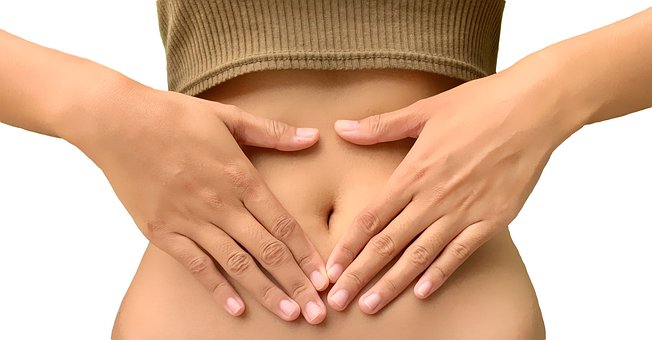The gut is a nine-meter-long tube that starts at the mouth, moves from the esophagus to the stomach, through the small and large intestines, and ends at the anus. It’s where digestion takes place, and this involves three important processes:
- Breaking down food into smaller pieces.
- Absorbing what our body needs from what we eat.
- Getting rid of the waste that can’t be used by our bodies.
The Wellness Benefits of a Healthy Gut
Within the gut exists a thriving community of bacteria. Probiotics also help with digestion and provide support for immunity, skin health, and brain function.
100 trillion live bacteria living inside of us.
Your gut bacteria are helpful because they eat the food we eat. Not only does food provide energy and nourishment for us, but it also keeps our gut bacteria healthy and thriving.
In a study of twins it was determined that the composition of your gut bacteria is tied to your weight. Identical twins have exactly matching genes while non-identical twins share around 50% of the same genes. The results of a twin study suggest that our genes influence what type of bacteria we have in our gut, and that the abundance of bacteria could affect our weight.
This suggests that diversity in gut bacteria is just as important as the number of bacteria. We are more likely to experience health benefits if we have more species.
To ensure the health of our gut bacteria, it is important to eat a diverse diet full of different types of food. Each species feeds on different things- and they can be just as choosy as we are when it comes to their food.
Mood and Brain Function
Your gut microbiome’s health has an effect on your cognitive function and mood. There is a two-way relationship between the gut and the brain known as the gut-brain axis.
These include chemicals like dopamine and serotonin, which have a large impact on mood. Gut bacteria greatly impacts the activity of various brain chemicals, known as neurotransmitters. These include chemicals like dopamine and serotonin, which play a large role in mood. 90% of serotonin is made in the gut.
According to research, people with anxiety, depression, and autism tend to have a greater imbalance of bacteria in their gut, with more negative bacteria than positive, compared to healthy people.
Sleep
Your gut bacteria has a strong influence on your sleep quality.
Imbalances in the gut microbiome are associated with increased risk of sleep disturbances and poorer sleep quality. This means that gut bacteria affects sleep by controlling the hormones that regulate sleep.
Weight
The gut bacteria produce short-chain fatty acids (SCFA) which then influence the production of hunger and fullness hormones.
People with a healthy gut bacteria composition tend to produce more SCFAs (short-chain fatty acids), which reduces hunger and increases fullness. This affects eating habits and weight.
Overweight individuals have different gut bacteria than lean individuals, according to research.
The Best Foods for a Healthy Gut
1. High-Fiber Foods
High-fiber foods help gut bacteria to thrive and grow, which is important for improving and maintaining a healthy gut.
Some nutritionist recommendations include:
- Classic wholegrains: brown rice, bread, pasta.
- More unusual wholegrain sources: quinoa, amaranth. These are naturally gluten free, have a pleasant nutty taste, and make a good alternative to rice or couscous.
- Dried fruits
- Lentils
2. Colorful Fruits and Vegetables
Different chemicals found in fruits and vegetables can help encourage the production of positive bacteria in your gut, reducing inflammation and creating a positive environment for gut health.
Eliza Glynn, a nutritionist at Holland & Barrett, says that plant-based diets are often better for the gut microbiome because they are naturally higher in fiber and phytochemicals.
3. Prebiotics Foods
Foods that contain special fiber that is loved by good gut bacteria are called prebiotic foods. Some examples of prebiotic foods include garlic, onion, chickpeas, beans, artichoke, bananas, leeks, milled flaxseeds, and oat bran.
The term “prebiotic” is used to describe a substance that is not made up of live bacteria, but rather helps to feed existing bacteria in the microbiome.
If you find it difficult to consume enough prebiotic foods, you can add inulin powder to sweet foods or breakfast as a way to help increase your intake.
4. Probiotic Foods: Sauerkraut
A national dish of Germany, sauerkraut is made by fermenting finely cut raw cabbage with multiple lactic acid bacteria. This product is full of good bacteria and has been shown to reduce inflammation.
However, some studies suggest that people may experience diarrhea if they eat sauerkraut too often.
5. Probiotic Foods: Kimchi
Kimchi is like Korea’s version of sauerkraut. This side dish is made of salted and fermented vegetables, such as cabbage, radish, spring onions, garlic, ginger, and various seasonings. The vegetables are mixed together and then placed in a jars, where they are left to ferment for several weeks.
Lactic acid bacteria is known to help with gut health, so kimchi that undergoes fermentation with lactic acid bacteria is also good for gut health.
Sauerkraut and Kimchi not to your taste? The beneficial bacteria in sourdough bread can be a gentler way to get them into your diet.
6. Probiotic Foods: Miso
Miso is a fermented product made from soybeans.
This food not only helps good bacteria in your microbiome, but also helps your gut produce vitamins K and B12. These vitamins help your body heal and regulate metabolism and energy.
7. Probiotic Foods: Kefir
Kefir is a fermented milk drink that has a similar consistency to runny yoghurt.
Kefir grains are used to make a popular drink that is known for its versatility and ability to aid digestion, reduce inflammation, and even strengthen bones as a source of calcium.
8. Polyphenols
The following plant foods contain antioxidants: berries, purple carrots, spinach, grapes and dark chocolate. Polyphenols give black rice and dark beans their color.
Dried fruit that is high in polyphenols, like raisins, are dried in a way that concentrates the polyphenol content.
Polyphenols that are not broken down and absorbed in the small intestine reach the large intestine, where they help gut bacteria to produce compounds that support immune functioning, brain health, and digestion.
READ MORE: 7 Foods Rich In Polyphenols And Their Benefits
9. Dandelion Greens
This super healthy green is GREAT for your gut. Dandelion greens contain many minerals which improve blood lipids, and they are also rich in inulin. Inulin is a type of prebiotic fiber which helps your gut to produce more healthy bacteria, like bifidobacteria.
According to David Perlmutter, MD, increasing the population of bifidobacteria has several benefits, including reducing the population of harmful bacteria, making bowel movements easier, and boosting the immune system.
Dandelion greens can be bitter. You can drink them as tea or use them in soups and salads.
10. Broccoli
Not everyone is a fan of broccoli, but its health benefits are undeniable.
The same effects may also apply to other vegetables in the cruciferous family. You should buy a lot of cauliflower, Brussels sprouts, kale, and cabbage. You can cook them in a variety of ways, such as stir-frying, roasting, or steaming. You can also grate them and put them on top of your favorite salad.
11. Asparagus
These green stalks, which are rich in prebiotics, are both delicious and good for you. Like dandelion greens, asparagus is also rich in inulin. It can help promote regularity and decrease bloating.
You can eat asparagus by steaming it, sauteing it, roasting it, or chopping it raw to put in salads. You can also lightly steam and chop asparagus to put over quinoa or rice, or add it to other dishes.
12. Seaweed
Seaweed is hardly a weed. This food would more accurately be called a “sea gem” because of its nutrient- and fiber-rich benefits.
A study found that Japanese women who consumed a lot of seaweed had more good gut bacteria than those who didn’t. Alginate, a substance in brown seaweed, can strengthen gut mucus, slow down digestion, and make food release its energy more slowly.
If you’re wondering how you can consume it, here are several suggestions. Try wraps made with nori (dried seaweed sheets), seaweed salad, soup with wakame, or stir fry or beans with kombu (edible kelp).
13. Jerusalem Artichoke
Although it may not be widely known, this tuber is one of the best foods for gut health due to its high inulin content. Although it has the same name, this root vegetable is very different from the leafy green artichoke. It is starchy, savory, and has a slightly sweet and nutty taste.
If you are new to eating Jerusalem artichokes, be aware that they can cause increased digestive activity. For those who are new to this, you can cook them like you would a potato. The most gut-boosting benefits can be achieved by shredding Jerusalem artichoke raw and adding it to salads.
14. Jicama
This vegetable has a lot of fiber and is fresh, sweet, and crunchy. One cup of raw jicama contains 6g of fiber, which is 15% of your recommended daily intake. Adding it to a salad will boost the amount of fiber you consume.
Jicama is a great weight-loss and blood sugar-control food. Plus, it’s high in vitamin C. The textured of this vegetable is good for salads, smoothies, and stir-fries.
15. Flaxseed
This seed has a high content of lignans (antioxidants with anticancer properties) thanks to its wealth of phytonutrient precursors. Flaxseed fuels your good gut flora.
The seeds have soluble fiber, which can help with regularity of digestion.
Eat ground flaxseed sprinkled on smoothie bowls or salads. Whole flax seeds will pass through your body without being digested, so be sure to choose freshly ground flaxseed, or grind it fresh yourself.
Also, know that flaxseed goes rancid (or bad) quickly. You will get the best results by buying whole seeds and grinding them in small batches yourself, and storing them in the fridge or freezer. And, yes, rancid flaxseed will taste bitter and unpleasant.
16. Bananas
The popular and versatile fruit is good at restoring the balance in your gut’s ecosystem.
Bananas are also rich in potassium and magnesium, which can help reduce inflammation. A 2011 study showed that bananas can help reduce bloating and support release of excess weight.
You can add bananas to your cereal, make them into a smoothie, or have them as a snack.
17. Apples
Apples are one of the easiest fruits to find, and they make a great addition to your diet. They are high in fiber. A study published in 2014 found that green apples help increase the amount of good gut bacteria.
Eat apples raw as a snack. Or you can even enjoy them stewed. Stewed apples may help to improve your microbiome and heal your gut.
Apples are one of the produce items that contain the most pesticides, so it is best to purchase organic apples when possible.
18. Garlic
This food flavoring is not only great tasting, but also good for your gut health.
According to a 2013 study published in Food Science and Human Wellness, garlic can help to promote the growth of good gut bacteria. The study found that garlic could also help reduce the risk of some gastrointestinal conditions.
So go wild! Throw garlic into many of your favorite foods. Make sure to add some raw garlic to your dish as well, as it contains the most prebiotic benefits.
19. Gum Arabic
Even though you may not have heard of this food, it is a prebiotic and contains a lot of fiber.
Acacia fiber is also known as a powder that can be stirred in water and drank, or taken as a supplement.
Conclusion
What you eat can impact the health of your gut microbiome. If you do not have healthy eating habits you may need to add some supplements to your routine to ensure good gut health.
The communication between your gut and brain can affect digestion, mood and other body systems—hence the gut’s nickname, “second brain.”
If you follow the recommendations in this article, you’ll be supporting better bathroom habits, a healthier immune response, and a better mood. If you take care of your gut, you can improve your overall health.









